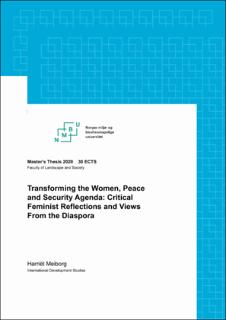| dc.description.abstract | Although the Women, Peace and Security agenda is celebrated by many across activist, academic and policy environments, it has also been subject to critique. Whereas many debates have revolved around implementation gaps, improving strategies and priorities for action, others have questioned more fundamental aspects of the WPS agenda. For example, the assumption of a liberal version of peace and gender equality which are not necessarily inclusive of all interests (Parashar, 2019); the absence of a critique on militarism (Gibbings, 2011; Hudson, 2009), its failure to account for the ways in which gender relates to racial, sexual and classed oppressions (De Almagro, 2018) and the disproportionate control of powerful countries and institutions over the agenda (Shepherd, 2008; Pratt & Richter-Devroe, 2011). Critical studies as these demonstrate how unequal and exclusionary dynamics are embedded in the very agenda of WPS. While these studies provide a starting point for critical inquiry into the agenda, this thesis aims to further such efforts by examining the challenges and opportunities for progressive WPS policy and practice through the lens of critical feminist theories. Drawing on socialist feminist, postmodern feminist and postcolonial/transnational feminist insights, this thesis first seeks to identify in what ways injustices and inequalities may be countered or reproduced in WPS policy discourse. Recognising that policy understandings oftentimes differ from practice, it will then explore how these critical feminist theories relate to the views of a specific set of WPS practitioners in the Netherlands. Four diasporic actors active in the Dutch WPS community were selected. While being part of the same WPS community, the practitioners come from different backgrounds and relate to the WPS agenda in different ways. Apart from providing a view from practice, diasporic actors are a particularly interesting site for investigating the challenges and opportunities for progressive WPS politics. Unlike other non-state actors in international politics, the diaspora is located at the interface of the local and the global and often combines both institutional and confrontational means to advance their agendas. Involving diaspora women in these conversations, then, may tell us more about the possibility of a transformative WPS project through or beyond critical feminist theories. | en_US |

